|
|
|
Sort Order |
|
|
|
Items / Page
|
|
|
|
|
|
|
| Srl | Item |
| 1 |
ID:
128548
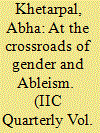

|
|
|
| 2 |
ID:
107192
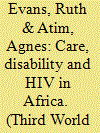

|
|
|
|
|
| Publication |
2011.
|
| Summary/Abstract |
Recent research and policy have recognised the central role of unpaid care-givers (often women and girls) in the global South. Disability rights perspectives, however, challenge the language of 'care' and 'dependence'. Drawing on qualitative research with women living with HIV and children caring for them in Tanzania, and on learning from the National Community of Women Living with HIV and AIDS in Uganda (NACWOLA), this paper explores the divergences and interconnections between the concepts and practices of care, disability and HIV in the context of East Africa. Despite the development of interdependent caring relations, both care-givers and people living with HIV in Tanzania experience 'diminished autonomy'. The participation of people living with HIV, including disabled people, in home-based care and in peer support groups, however, can enhance 'relational autonomy' for both care-givers and care-recipients. We reflect on opportunities and challenges for mutual learning and cross-movement advocacy by disabled people, people living with HIV and care-givers.
|
|
|
|
|
|
|
|
|
|
|
|
|
|
|
|
| 3 |
ID:
181529
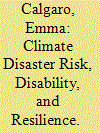

|
|
|
|
|
| Summary/Abstract |
This essay examines the everyday inequalities, stigmas, and injustices that leave people with disabilities highly vulnerable to escalating climate change risks. It argues that including people with disabilities in disaster risk reduction processes is essential to shaping inclusive, effective policies and practices. Examples of several programs that have done so are discussed. Focusing on the strengths of people with disabilities as resilient change-makers and as the experts in their own lives—instead of viewing them as dependent on others—can lead to the changes necessary to recognize their personal sovereignty and deliver disaster justice. Third in a series on disability rights around the world.
|
|
|
|
|
|
|
|
|
|
|
|
|
|
|
|
| 4 |
ID:
107197
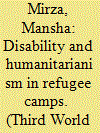

|
|
|
|
|
| Publication |
2011.
|
| Summary/Abstract |
There are an estimated 43.3 million forcibly displaced people around the world, many of whom live in refugee or internally displaced camps. These camps are disproportionately congregated in the developing world, making them a prevalent, yet often overlooked landscape in the global South. Among the scores of refugees living in refugee camps is a large number of people with disabilities. This article provides an overview of humanitarian practices and their guiding philosophies and how these address disability issues within the context of refugee camps. Examples of grassroots initiatives related to disability rights and disability inclusion within refugee camp settings are also provided. Using these examples, the paper makes the argument that refugee camps offer fertile grounds for the diffusion of a community-engaged, grassroots disability praxis across the humanitarian field and beyond.
|
|
|
|
|
|
|
|
|
|
|
|
|
|
|
|
| 5 |
ID:
107195
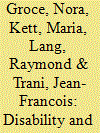

|
|
|
|
|
| Publication |
2011.
|
| Summary/Abstract |
The international development community is beginning to recognise that people with disabilities constitute among the poorest and most vulnerable of all groups, and thus must be a core issue in development policies and programmes. Yet the relationship between disability and poverty remains ill-defined and under-researched, with few studies providing robust and verifiable data that examine the intricacies of this relationship. A second, linked issue is the need for-and current lack of-criteria to assess whether and how disability-specific and disability 'mainstreamed' or 'inclusive' programmes work in combating the exclusion, marginalisation and poverty of people with disabilities. This article reviews existing knowledge and theory regarding the disability-poverty nexus. Using both established theoretical constructs and field-based data, it attempts to identify what knowledge gaps exist and need to be addressed with future research.
|
|
|
|
|
|
|
|
|
|
|
|
|
|
|
|
| 6 |
ID:
181868
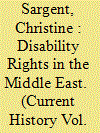

|
|
|
|
|
| Summary/Abstract |
Across the Middle East, two key dynamics characterize disability rights movements: dynamism and fragility. The United Nations Convention on the Rights of Persons with Disabilities accelerated regional recognition of disability as central to human development and social justice initiatives. New communication platforms, legislative interventions, and institutional capacity-building reflect currents of change and innovation—frequently driven by ground-up initiatives led by or in collaboration with disabled persons’ organizations. At the same time, the COVID-19 pandemic and protracted humanitarian crises pose threats to health and well-being across the region, with grave implications for disabled persons and their movements.
|
|
|
|
|
|
|
|
|
|
|
|
|
|
|
|
| 7 |
ID:
087435
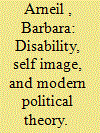

|
|
|
|
|
| Publication |
2009.
|
| Summary/Abstract |
Charles Taylor argues that recognition begins with the politics of "self-image," as groups represented in the past by others in ways harmful to their own identity replace negative historical self-images with positive ones of their own making. Given the centrality of "self image" to his politics of recognition, it is striking that Taylor, himself, represents disabled people in language that is both limiting and depreciating. The author argues such negative self-images are not unique to Taylor but endemic to modern political thought from John Locke to John Rawls, as the disabled ("irrational" and/or mentally disabled/ill people) are constituted in direct opposition to the rational person and/or citizen. Using contemporary social theories of disability, as articulated by disabled scholars and advocates, the author concludes that such negative self-images (and the binary of autonomy/justice and dependency/charity underpinning them) must be purged from political theory and replaced with an alternative theory of personhood/citizenship rooted in the image of interdependency.
|
|
|
|
|
|
|
|
|
|
|
|
|
|
|
|
| 8 |
ID:
180076
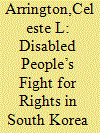

|
|
|
|
|
| Summary/Abstract |
Long considered objects of pity and welfare assistance, people with disabilities in South Korea and Japan are increasingly treated as rights-bearers. Through activism, litigation, and involvement in international treaty negotiations, Koreans and Japanese with disabilities spurred reforms that created new anti-discrimination protections and obligations to provide reasonable accommodations, access, employment, and social supports. These policy changes also signal a notably more legalistic approach to governance, particularly in South Korea, because they include more detailed rules and formal rights, more enforcement mechanisms like fines, and better recourse to judicial or other dispute resolution bodies.
|
|
|
|
|
|
|
|
|
|
|
|
|
|
|
|
| 9 |
ID:
138880


|
|
|
|
|
| Summary/Abstract |
Scotland has laid claim to being ‘different’ from the rest of the UK with regards to disability policy. This article examines the evidence for that with regard to long-term and social care, and discusses the possibilities opened up by the devolution of disability benefits. It asks whether Scotland will demonstrate policy divergence from the rest of the UK, and whether that is likely to be beneficial for disabled people. It argues that Scotland has the potential to create better social policies for disabled people, but faces significant challenges in doing so.
|
|
|
|
|
|
|
|
|
|
|
|
|
|
|
|
| 10 |
ID:
110878


|
|
|
|
|
| Publication |
2010.
|
| Summary/Abstract |
This essay provides a historical analysis of Iranian experiences with disability. I will begin by reviewing the literary application of the term in various contexts. Next, I will examine the social milieux in which local observers, medical professionals, and policy makers talked about and treated disability. As state-run institutions emerged to address disability needs, health professionals often drew a distinction between physical disability and intellectual or psychological disability, raising ethical and legal questions about the status of the disabled in modern Iranian society. Finally, an attempt will be made to situate disability politics in contemporary Iran, where the disabled population has increased significantly as a consequence of the Iran-Iraq War (1980-88). Although this paper concentrates on Iranian experiences with disability, comparisons can be drawn with other Islamic societies.
|
|
|
|
|
|
|
|
|
|
|
|
|
|
|
|
| 11 |
ID:
185744
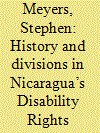

|
|
|
|
|
| Summary/Abstract |
The UN Convention on the Rights of Persons with Disabilities represents an important innovation in international law. For the first time, states are legally obligated to seek the advice of civil society organizations representing rights-holders in the development of legislation and policies and the monitoring of their implementation. In Nicaragua, however, the civic history of the Sandinista Revolution and civil war has left the local disability movement divided. Disabled war veterans want laws guaranteeing special treatment; self-help groups would rather focus on providing their own services than advocating for new laws. This demonstrates that the success of the CRPD’s civil society provisions is as dependent on the local identities and experiences of disabled people as it is on states’ adherence to international law.
|
|
|
|
|
|
|
|
|
|
|
|
|
|
|
|
| 12 |
ID:
158930
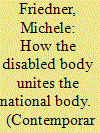

|
|
|
|
|
| Summary/Abstract |
This article analyzes both representations of disability in popular media and the role of disabled workers in urban India and demonstrates how the category of disability becomes a form of non-threatening ‘feel good’ diversity. Unlike other axes of difference such as class, caste, gender, sexuality, and religion, India’s disability rights movement, corporations, and mainstream media represent disability as largely apolitical. Drawing on Nehruvian ideals about ‘unity in diversity’, this article discusses how disability functions as a means of imagining and creating unity in India. As a result of skillful manipulation that collapses and conflates nationalist and neoliberal projects, the success of disabled people is considered to be synonymous with the success of the nation. This essay thus examines how thinking, feeling, and representing through disability provides a new way of conceptualizing the nation and critically engages with ideas and ideals of ‘disability publics’. Disability is rendered into a representation and while tension exists between feeling good and feeling bad, the specter of a contentious disability politics is kept at bay.
|
|
|
|
|
|
|
|
|
|
|
|
|
|
|
|
| 13 |
ID:
107188
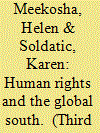

|
|
|
|
|
| Publication |
2011.
|
| Summary/Abstract |
This article seeks to examine the politics of human rights and disability in light of the recent United Nations Convention on the Rights of People with Disabilities (UNCRPD), which has been central to the struggle for recognition of disabled people. Northern discourses of disability rights have strongly influenced the UNCRPD. We argue that many of the everyday experiences of disabled people in the global South lie outside the reach of human rights instruments. So we ask what, if anything, can these instruments contribute to the struggle for disability justice in the South? While Northern discourses promote an examination of disabled bodies in social dynamics, we argue that the politics of impairment in the global South must understand social dynamics in bodies.
|
|
|
|
|
|
|
|
|
|
|
|
|
|
|
|
| 14 |
ID:
183205
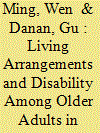

|
|
|
|
|
| Summary/Abstract |
Using data from a large representative longitudinal sample of older adults in China, the current study examines the associations between living arrangements and disability measured by activities of daily living (ADL) and instrumental activities of daily living (IADL). The cross-sectional models showed that living alone was associated with the lowest odds of disability among all the seven types of living arrangements. Living with others who are not spouses or offspring and living in an institution were linked to the highest odds of disability, particularly in more recent waves. Other forms of living arrangements such as living with spouse only, living with adult children and living in skipped-generation households lay somewhere in the middle in the correlation to disability. Findings from the transitional models revealed that moving from independent living towards co-residence with family corresponded to higher risks of disability. Overall, the associations were stronger for ADL disability than for IADL disability. The authors observed temporal fluctuations rather than linear trends in these patterns across the 16 years of the study from 2002 to 2018. Study implications are discussed.
|
|
|
|
|
|
|
|
|
|
|
|
|
|
|
|
| 15 |
ID:
169004
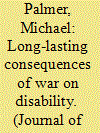

|
|
|
|
|
| Summary/Abstract |
This article investigates the impact of exposure to United States air force bombing during 1965–75 on the disability status of individuals in Vietnam in 2009. Using a combination of national census and US military data and an instrumental variable strategy which exploits the distance to the former North–South border as a quasi-experiment, the article finds a positive and significant impact of bombing exposure on district level disability rates 40 years after the war. The overall effect of bombing on the long-term disability rate among the Vietnamese population is highest among heavily bombed districts. Districts in the top bombing quintile experience a 25% relative increase in the rate of disability attributable to bombing compared with districts in the lowest bombing quintile. Effects are highest on the prevalence of severe disability and among cohorts before the war’s end. A smaller, yet significant, effect is found among cohorts born after the war. The article finds further evidence of indirect channels through which bombing may have impacted on long-term disability including adverse effects on nutritional environment and human capital attainment. These findings add to the evidence from Vietnam and indicate that wars inflict costs on the health of human populations that last longer than those relating to economic growth and welfare.
|
|
|
|
|
|
|
|
|
|
|
|
|
|
|
|
| 16 |
ID:
158919
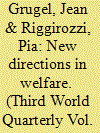

|
|
|
|
|
| Summary/Abstract |
What happens to the politics of welfare in the Global South when neoliberal values are questioned? How is welfare re-imagined and re-enacted when governments seek to introduce progressive change? Latin America provides an illustration and a valuable entry point to debates about ‘interruptions’ of neoliberalism and the changing nature of social policy. Drawing on examples of disability policies in Ecuador and care provision in Uruguay, we argue that there is a ‘rights turn’ in welfare provision under the left that reflects a recognition that previous welfare models left too many people out, ethically and politically, as well as efforts to embed welfare more centrally in new patterns of respect for socio-economic and identity-based human rights. Given Latin America’s recent contestation of neoliberal development as well as its history of sometimes dramatic welfare shifts, the emergence of rights-based social provision is significant not just for the region but also in relation to global struggles for more equitable governance.
|
|
|
|
|
|
|
|
|
|
|
|
|
|
|
|
| 17 |
ID:
151488


|
|
|
|
|
| Summary/Abstract |
Perspectives on disability originating from non-Western cultures are beginning to appear in disability literature, however discussions may become lost in rhetoric unless grounded in experiences of people with disabilities themselves. The purpose of this study was to investigate the lived experience of physical disability in Timor Leste with the assistance of a group of Timorese participants with disabilities who were employed in the disability sector. These participants recounted experiences of disability from their own lives together with their observations of people with disabilities living in remote parts of Timor Leste who often lived with stigma or deprivation. The participants thus described their own lived experiences against a backdrop of a non-Western culture. A picture emerged of a stigmatising culture where acceptance of disability is uncommon yet where significant attempts are being made to change attitudes to disability within the culture of Timor Leste.
|
|
|
|
|
|
|
|
|
|
|
|
|
|
|
|
| 18 |
ID:
165134
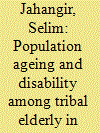

|
|
|
|
|
| Summary/Abstract |
The prevalence of disability in activities of daily livings is higher among Indian elderly as compared to other ageing countries in Asia. This study provides an overview of the prevalence of disability by gender and region (rural and urban) among the tribal elderly in West Bengal, India. Cross-tabulation method was employed to examine the pattern of tribal ageing disability in all 19 districts of West Bengal. Based on Census 2011 data, the study showed that prevalence of disability among tribal elderly was significantly higher than general elderly population. The study also validated the low socio-economic and vulnerable condition of the ethnic groups in different districts of the State. The governments should implement the public health policies to reduce the burden of disability by providing healthcare services, education and social and economic security particularly to the rural tribal elderly disabled people for their better quality of life.
|
|
|
|
|
|
|
|
|
|
|
|
|
|
|
|
| 19 |
ID:
107198
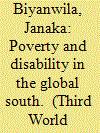

|
|
|
| 20 |
ID:
165679
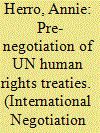

|
|
|
|
|
| Summary/Abstract |
Since 1965, nine UN human rights treaties have been adopted. Surprisingly, we know little about the conditions under which states arrived at the negotiation table because there has been no serious attempt to empirically identify the unique attributes of pre-negotiation in this context. This article examines the pre-negotiation of the UN Convention on the Rights of Persons (CRPD), drawing on diverse qualitative data sources such as interviews with state and non-state participants. Informed by a constructivist perspective, this study identifies esteem-seeking behavior as a key motivation for some states to negotiate. The article also shows how a transnational advocacy network influenced the pre-negotiation process by leveraging states’ esteem-seeking ambitions and appealing to their reputation as a way of pushing parties to negotiate. Additional tactics that the transnational advocacy network employ at the international level to expedite negotiations are also identified.
|
|
|
|
|
|
|
|
|
|
|
|
|
|
|
|
|
|
|
|
|